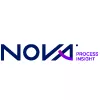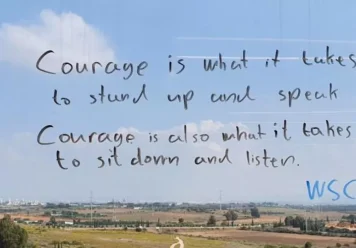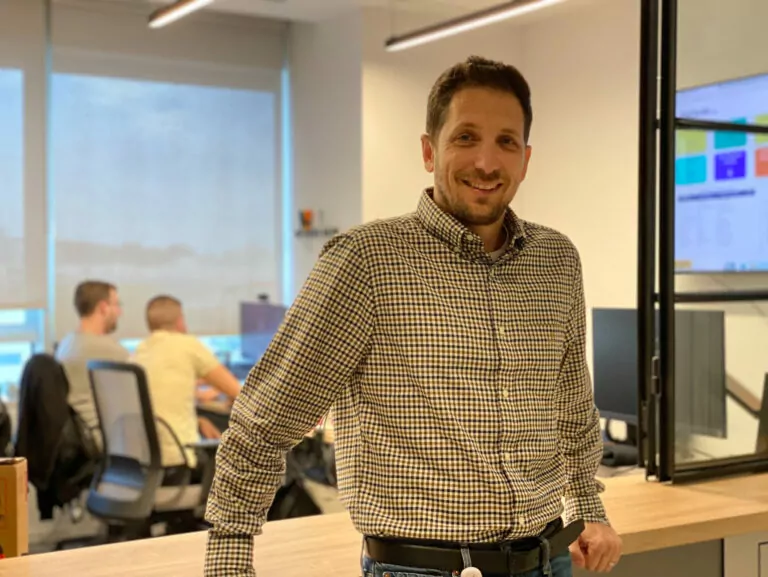Before I start, I want to say that even if just one person reads my story and is inspired to not to be afraid and talk about their disability, I will count that as a win. That’s part of my motivation for speaking up.
I am 42 years old and have been married for 15 years with two children, Emma and Omar. I’ve been working at Nova for a year.
I studied computer science, and I started working in technical support for MATV, an NGO, that provides nursing services for the elderly and people with disabilities. I worked there for 13 years, and there I developed empathy for the elderly and people with special needs or disabilities.
This was an experience that went beyond professional technological experience. The only thing I chose to ignore is that I, too, have special needs.
Are you willing to share a little about that?
I was born a healthy child, but at the age of two, I suffered an ear infection. During the treatment, my ear was injured, which created a reoccurring inflammation. To treat it, I had to endure eight surgeries by the age of 13. Still today I get emotional when I talk about it because it brings back a lot of feelings and memories that I tried to bury.
At 13, a miracle happened, and I was completely healthy without any inflammation or problems. Although I still had a slight hearing impairment, I was a child, and it was not tangible to me, so I felt I could manage it.
At 18, after an event in which I was exposed to loud noise, my ear infections returned, and I have been living with chronic infections ever since.
Apparently, the compounding effects of surgeries and inflammations over the years led to a decrease in hearing, and it got to the point where I was already aware of it, but I still didn’t attach importance to it and suppressed it.
I think that about five years ago, I started to feel it more. I felt that I was making a substantial effort to hear and understand and would ask people many times to repeat themselves. I was uncomfortable being in noisy environments or having conversations of more than a few sentences because it requires a lot of energy from me to concentrate and understand.
How did your environment react?
My mom kept saying she thought I should take care of it, and I was in denial. I repeatedly said that I heard perfectly well and everything was fine. I lived with a difficulty that became my reality. I didn’t see anything in it that was bad or wrong. On the other hand, I ignored that my confidence and credibility were compromised by being in the media and talking with people. I reduced the number of my work meetings because I was tired of asking again and again for others to repeat what they were saying. There were also unpleasant cases in which I did not understand what was said to me, so the answer I gave was inappropriate.
And when did you feel it was time for a change?
When I arrived at Nova, I realized that my hearing was impaired and that I needed help. And yet I was afraid to do anything about it. I was afraid and hesitant to recognize myself as a person with a disability. I was afraid of the stigma of using a hearing aid and that outsiders would label me.
Over the years, I trained myself in lip-reading skills and techniques of asking questions and checking to ensure I understood what was said. I also invested a lot of effort and energy in ensuring I understood well. The bottom line was it was good enough.
When I joined Nova, I used all these tools and techniques. Still, after a short while, I realized that all the aids I adopted were not helping me here, especially when it came to digital multi-participant conversations where there are teams from all over the world with different languages and accents. After a month of working at Nova, I realized that I was in trouble and that I was really having a hard time understanding–all because I couldn’t hear well enough.
What were you afraid would happen when you told your team and manager here about the disability?
I was new to Nova and I wanted to make the best impression at the same time, I felt that I didn’t understand the things discussed with me and that it would raise questions about my professional performance. I admit that at first, I had an irrational fear that if I share that I have a disability the people around me will not accept this.
Despite my worry and since it was vital for me to give the best of myself and to make a good impression at Nova, I finally decided to talk to my manager, and I revealed to him that I have a hearing disability and that I was going to take care of myself.
He was shocked at first but very accepting and supportive. I felt great relief when I got it out.
It turned out that after 13 years at MATAV, an organization that helps adults and people with various disabilities, in the end, joining Nova was a catalyst for treating my hearing impairment. And I must mention that my boss and all the people here are amazing and supportive; this is part of Nova’s DNA.
What significant moment do you remember in the process?
I remember several such moments.
I started the process of being fitted for hearing aids with a speech therapist and suddenly I could hear well, even sounds and vibrations I wasn’t aware of before. My wife was present with me, and at one point, she burst into tears because she realized the difference between before to now. I also realized how much I had missed avoiding dealing with my disability.
In the work environment, when I came to terms with the situation and after adjusting the hearing aids, there were a few days when I forgot them at home and felt frustrated because I realized that it would be another day with a great effort to understand. Now, I am already beyond the denial stage. I finally accept the situation and the help offered to me to live a normal life.
Even with my mother, who had supported me for all these years and encouraged me to get tested, there was a stage when I reached out to her and thanked her for her support even though, for many years, I rejected her offer to get tested.
And from all this good, one negative result came out: I lost the right to pretend I don’t hear my wife when she talks to me (laughs)!
What excites you in your daily work?
I am a people person. I have always seen myself as a conduit for connecting people and technology. At Nova, I get an opportunity daily to do just that. The desire to help and do good is an inseparable part of who I am; therefore, my profession allows me to express myself. Improving service and my desire for the employee to have the opportunity to do the job in the best way are central parts of my work.
Why do you choose to work at Nova?
I really connect with Nova’s corporate culture–the employee (the person) is at the center. I feel it in my experience as an employee and manager, as well as in interactions with my colleagues. And, of course, this people-centric culture stood out when I decided to look my disability in the eye, and I received the support of everyone around me.
In my experience, Nova sees the employee as a critical part of its existence; I feel that there is a listening ear and an understanding for the needs of the employees. On a professional level, I have room for a lot of creativity, allowing me to promote global processes regarding service improvement.
Where do you see yourself in the future?
I see myself as an integral part of Nova. My goal is that in about five years, I will be able to look back and feel that my service to Nova’s employees is excellent, and I’ve helped create tools that will enable a high level of service, so the entire team works together like a well-oiled machine.



